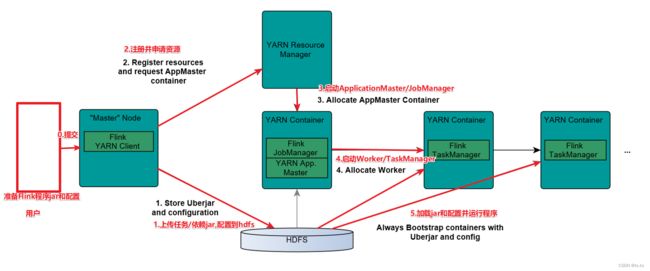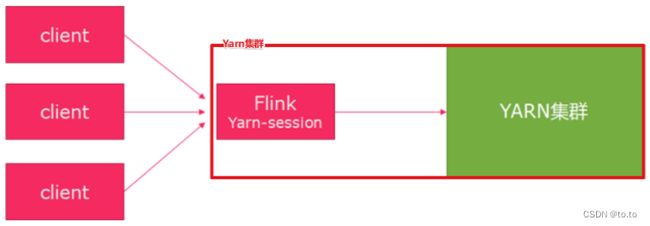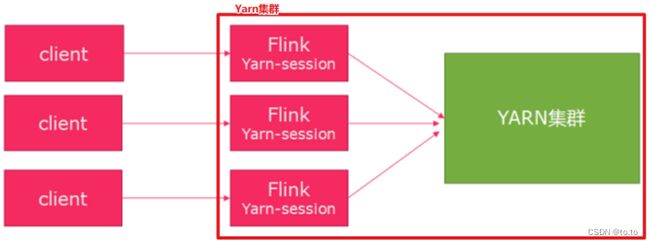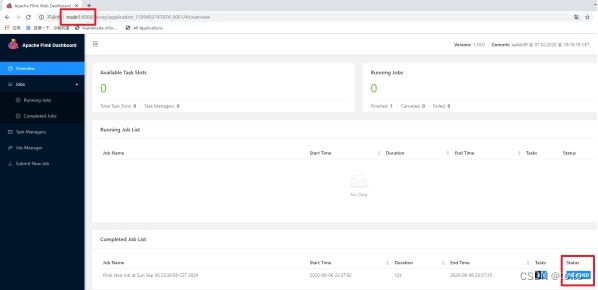3.Flink-On-Yarn开发使用\原理\Session会话模式\Per-Job模式
本文来自:Flink1.12-2021黑马程序员贺岁视频
3.Flink-On-Yarn开发使用
3.1.原理
3.2.两种模式
3.2.1.Session会话模式
3.2.2.Per-Job模式
3.3.操作
3.4.测试
3.4.1.Session会话模式
3.4.2.PerJob模式
3.Flink-On-Yarn开发使用
3.1.原理
为什么使用flink on yarn ?
在实际开发中,使用Flink时,更多的使用方式是Flink On Yarn模式,原因如下:
- 1.Yarn的资源可以按需使用,提高集群的资源利用率。
- 2.Yarn的任务有优先级,根据优先级运行作业。
- 3.基于Yarn调度系统,能够自动化地处理各个角色的Failover(容错)
A: JobManager进程和TaskManager进程都由Yarn NodeManager监控。
B:如果JobManager进程异常退出,则Yarn ResourceManager会重新调度JobManager到其他机器。
C:如果TaskManager进程异常退出,JobManager会收到消息重新向Yarn ResourceManager申请资源,重新启动TaskManager

具体步骤:
准备Flink程序jar和配置
0:提交
1:上传任务/依赖jar,配置到hdfs
2: 注册并申请资源。
3:启动ApplicationMaster/JobManager
4: 启动Worker/TaskManager
5: 加载jar和配置并运行程序。
3.2.两种模式
3.2.1.Session会话模式
Session模式:在yarn集群中启动了一个Flink集群,并重复使用该集群。

特点:需要事先申请资源,启动JobManager和TaskManager
优点:不需要每次递交作业申请资源,而是使用已经申请好的资源,从而提高执行效率。
缺点:作业执行完成以后,资源不会被释放,因此一直会占用系统资源。
应用场景:适合作业递交比较频繁的场景,小作业比较多的场景。
3.2.2.Per-Job模式
针对每个Flink任务都去启动一个独立Flink集群,用完就关,不能重复使用该集群。

特点:每次递交作业都需要申请一次资源。
优点:作业运行完成,资源会立刻被释放,不会一直占用系统资源。
缺点:每次递交作业需要申请资源,会影响执行效率,因为申请资源需要消耗时间。
应用场景:适合作业比较少的场景、大作业的场景。
3.3.操作
1.关闭yarn的内存检查
vim /export/server/hadoop/etc/hadoop/yarn-site.xml
<property>
<name>yarn.nodemanager.pmem-check-enabledname>
<value>falsevalue>
property>
<property>
<name>yarn.nodemanager.vmem-check-enabledname>
<value>falsevalue>
property>
2.分发
scp -r /export/server/hadoop/etc/hadoop/yarn-site.xml node2:/export/server/hadoop/etc/hadoop/yarn-site.xml
scp -r /export/server/hadoop/etc/hadoop/yarn-site.xml node3:/export/server/hadoop/etc/hadoop/yarn-site.xml
3.重启yarn
/export/server/hadoop/sbin/stop-yarn.sh
/export/server/hadoop/sbin/start-yarn.sh
3.4.测试
3.4.1.Session会话模式
在Yarn上启动一个Flink集群,并重复使用该集群,后续提交的任务都是给该集群,资源会被一直占用,除非手动关闭该集群----适用于大量的小任务
1.在yarn上启动一个Flink集群/会话,node1上执行以下命令。
/export/server/flink/bin/yarn-session.sh -n 2 -tm 800 -s 1 -d
说明:
申请2个CPU、1600M内存。
A: -n表示申请2个容器,这里指的就是多少个taskmanager
B:-tm 表示每个TaskManager的内存大小.
C:-s表示每个TaskManager的sloths数量。
D:-d表示以后台程序方式运行。
注意:
该警告不用管
WARN org.apache.hadoop.hdfs.DFSClient - Caught exception
java.lang.InterruptedException
2.查看UI界面
http://node1:8088/cluster

3.使用flink run提交任务:
/export/server/flink/bin/flink run /export/server/flink/examples/batch/WordCount.jar
运行完之后可以继续运行其他的小任务
/export/server/flink/bin/flink run /export/server/flink/examples/batch/WordCount.jar
4.通过上方的ApplicationMaster可以进入Flink的管理界面


5.关闭yarn-session:
yarn application -kill application_1609508087977_0005

3.4.2.PerJob模式
针对每个Flink任务在yarn上启动一个独立的Flink集群并运行,结束后自动关闭并释放资源。(适用于大任务)
1.直接提交Job
/export/server/flink/bin/flink run -m yarn-cluster -yjm 1024 -ytm 1024 /export/server/flink/examples/batch/WordCount.jar
A -m jobmanager的地址
B -yjm 1024 指定jobmanager的内存信息
C -ytm 1024 指定taskmanager的内存信息
2.查看UI界面
http://node1:8088/cluster


参数说明:
/export/server/flink/bin/flink --help
SLF4J: Class path contains multiple SLF4J bindings.
SLF4J: Found binding in [jar:file:/export/server/flink/lib/log4j-slf4j-impl-2.12.1.jar!/org/slf4j/impl/StaticLoggerBinder.class]
SLF4J: Found binding in [jar:file:/export/server/hadoop-2.7.5/share/hadoop/common/lib/slf4j-log4j12-1.7.10.jar!/org/slf4j/impl/StaticLoggerBinder.class]
SLF4J: See http://www.slf4j.org/codes.html#multiple_bindings for an explanation.
SLF4J: Actual binding is of type [org.apache.logging.slf4j.Log4jLoggerFactory]
./flink <ACTION> [OPTIONS] [ARGUMENTS]
The following actions are available:
Action "run" compiles and runs a program.
Syntax: run [OPTIONS] <jar-file> <arguments>
"run" action options:
-c,--class <classname> Class with the program entry point
("main()" method). Only needed if the
JAR file does not specify the class in
its manifest.
-C,--classpath <url> Adds a URL to each user code
classloader on all nodes in the
cluster. The paths must specify a
protocol (e.g. file://) and be
accessible on all nodes (e.g. by means
of a NFS share). You can use this
option multiple times for specifying
more than one URL. The protocol must
be supported by the {@link
java.net.URLClassLoader}.
-d,--detached If present, runs the job in detached
mode
-n,--allowNonRestoredState Allow to skip savepoint state that
cannot be restored. You need to allow
this if you removed an operator from
your program that was part of the
program when the savepoint was
triggered.
-p,--parallelism <parallelism> The parallelism with which to run the
program. Optional flag to override the
default value specified in the
configuration.
-py,--python <pythonFile> Python script with the program entry
point. The dependent resources can be
configured with the `--pyFiles`
option.
-pyarch,--pyArchives <arg> Add python archive files for job. The
archive files will be extracted to the
working directory of python UDF
worker. Currently only zip-format is
supported. For each archive file, a
target directory be specified. If the
target directory name is specified,
the archive file will be extracted to
a name can directory with the
specified name. Otherwise, the archive
file will be extracted to a directory
with the same name of the archive
file. The files uploaded via this
option are accessible via relative
path. '#' could be used as the
separator of the archive file path and
the target directory name. Comma (',')
could be used as the separator to
specify multiple archive files. This
option can be used to upload the
virtual environment, the data files
used in Python UDF (e.g.: --pyArchives
file:///tmp/py37.zip,file:///tmp/data.
zip#data --pyExecutable
py37.zip/py37/bin/python). The data
files could be accessed in Python UDF,
e.g.: f = open('data/data.txt', 'r').
-pyexec,--pyExecutable <arg> Specify the path of the python
interpreter used to execute the python
UDF worker (e.g.: --pyExecutable
/usr/local/bin/python3). The python
UDF worker depends on Python 3.5+,
Apache Beam (version == 2.23.0), Pip
(version >= 7.1.0) and SetupTools
(version >= 37.0.0). Please ensure
that the specified environment meets
the above requirements.
-pyfs,--pyFiles <pythonFiles> Attach custom python files for job.
These files will be added to the
PYTHONPATH of both the local client
and the remote python UDF worker. The
standard python resource file suffixes
such as .py/.egg/.zip or directory are
all supported. Comma (',') could be
used as the separator to specify
multiple files (e.g.: --pyFiles
file:///tmp/myresource.zip,hdfs:///$na
menode_address/myresource2.zip).
-pym,--pyModule <pythonModule> Python module with the program entry
point. This option must be used in
conjunction with `--pyFiles`.
-pyreq,--pyRequirements <arg> Specify a requirements.txt file which
defines the third-party dependencies.
These dependencies will be installed
and added to the PYTHONPATH of the
python UDF worker. A directory which
contains the installation packages of
these dependencies could be specified
optionally. Use '#' as the separator
if the optional parameter exists
(e.g.: --pyRequirements
file:///tmp/requirements.txt#file:///t
mp/cached_dir).
-s,--fromSavepoint <savepointPath> Path to a savepoint to restore the job
from (for example
hdfs:///flink/savepoint-1537).
-sae,--shutdownOnAttachedExit If the job is submitted in attached
mode, perform a best-effort cluster
shutdown when the CLI is terminated
abruptly, e.g., in response to a user
interrupt, such as typing Ctrl + C.
Options for Generic CLI mode:
-D <property=value> Allows specifying multiple generic configuration
options. The available options can be found at
https://ci.apache.org/projects/flink/flink-docs-stabl
e/ops/config.html
-e,--executor <arg> DEPRECATED: Please use the -t option instead which is
also available with the "Application Mode".
The name of the executor to be used for executing the
given job, which is equivalent to the
"execution.target" config option. The currently
available executors are: "remote", "local",
"kubernetes-session", "yarn-per-job", "yarn-session".
-t,--target <arg> The deployment target for the given application,
which is equivalent to the "execution.target" config
option. For the "run" action the currently available
targets are: "remote", "local", "kubernetes-session",
"yarn-per-job", "yarn-session". For the
"run-application" action the currently available
targets are: "kubernetes-application",
"yarn-application".
Options for yarn-cluster mode:
-d,--detached If present, runs the job in detached
mode
-m,--jobmanager <arg> Set to yarn-cluster to use YARN
execution mode.
-yat,--yarnapplicationType <arg> Set a custom application type for the
application on YARN
-yD <property=value> use value for given property
-yd,--yarndetached If present, runs the job in detached
mode (deprecated; use non-YARN
specific option instead)
-yh,--yarnhelp Help for the Yarn session CLI.
-yid,--yarnapplicationId <arg> Attach to running YARN session
-yj,--yarnjar <arg> Path to Flink jar file
-yjm,--yarnjobManagerMemory <arg> Memory for JobManager Container with
optional unit (default: MB)
-ynl,--yarnnodeLabel <arg> Specify YARN node label for the YARN
application
-ynm,--yarnname <arg> Set a custom name for the application
on YARN
-yq,--yarnquery Display available YARN resources
(memory, cores)
-yqu,--yarnqueue <arg> Specify YARN queue.
-ys,--yarnslots <arg> Number of slots per TaskManager
-yt,--yarnship <arg> Ship files in the specified directory
(t for transfer)
-ytm,--yarntaskManagerMemory <arg> Memory per TaskManager Container with
optional unit (default: MB)
-yz,--yarnzookeeperNamespace <arg> Namespace to create the Zookeeper
sub-paths for high availability mode
-z,--zookeeperNamespace <arg> Namespace to create the Zookeeper
sub-paths for high availability mode
Options for default mode:
-D <property=value> Allows specifying multiple generic
configuration options. The available
options can be found at
https://ci.apache.org/projects/flink/flink-
docs-stable/ops/config.html
-m,--jobmanager <arg> Address of the JobManager to which to
connect. Use this flag to connect to a
different JobManager than the one specified
in the configuration. Attention: This
option is respected only if the
high-availability configuration is NONE.
-z,--zookeeperNamespace <arg> Namespace to create the Zookeeper sub-paths
for high availability mode
Action "run-application" runs an application in Application Mode.
Syntax: run-application [OPTIONS] <jar-file> <arguments>
Options for Generic CLI mode:
-D <property=value> Allows specifying multiple generic configuration
options. The available options can be found at
https://ci.apache.org/projects/flink/flink-docs-stabl
e/ops/config.html
-e,--executor <arg> DEPRECATED: Please use the -t option instead which is
also available with the "Application Mode".
The name of the executor to be used for executing the
given job, which is equivalent to the
"execution.target" config option. The currently
available executors are: "remote", "local",
"kubernetes-session", "yarn-per-job", "yarn-session".
-t,--target <arg> The deployment target for the given application,
which is equivalent to the "execution.target" config
option. For the "run" action the currently available
targets are: "remote", "local", "kubernetes-session",
"yarn-per-job", "yarn-session". For the
"run-application" action the currently available
targets are: "kubernetes-application",
"yarn-application".
Action "info" shows the optimized execution plan of the program (JSON).
Syntax: info [OPTIONS] <jar-file> <arguments>
"info" action options:
-c,--class <classname> Class with the program entry point
("main()" method). Only needed if the JAR
file does not specify the class in its
manifest.
-p,--parallelism <parallelism> The parallelism with which to run the
program. Optional flag to override the
default value specified in the
configuration.
Action "list" lists running and scheduled programs.
Syntax: list [OPTIONS]
"list" action options:
-a,--all Show all programs and their JobIDs
-r,--running Show only running programs and their JobIDs
-s,--scheduled Show only scheduled programs and their JobIDs
Options for Generic CLI mode:
-D <property=value> Allows specifying multiple generic configuration
options. The available options can be found at
https://ci.apache.org/projects/flink/flink-docs-stabl
e/ops/config.html
-e,--executor <arg> DEPRECATED: Please use the -t option instead which is
also available with the "Application Mode".
The name of the executor to be used for executing the
given job, which is equivalent to the
"execution.target" config option. The currently
available executors are: "remote", "local",
"kubernetes-session", "yarn-per-job", "yarn-session".
-t,--target <arg> The deployment target for the given application,
which is equivalent to the "execution.target" config
option. For the "run" action the currently available
targets are: "remote", "local", "kubernetes-session",
"yarn-per-job", "yarn-session". For the
"run-application" action the currently available
targets are: "kubernetes-application",
"yarn-application".
Options for yarn-cluster mode:
-m,--jobmanager <arg> Set to yarn-cluster to use YARN execution
mode.
-yid,--yarnapplicationId <arg> Attach to running YARN session
-z,--zookeeperNamespace <arg> Namespace to create the Zookeeper
sub-paths for high availability mode
Options for default mode:
-D <property=value> Allows specifying multiple generic
configuration options. The available
options can be found at
https://ci.apache.org/projects/flink/flink-
docs-stable/ops/config.html
-m,--jobmanager <arg> Address of the JobManager to which to
connect. Use this flag to connect to a
different JobManager than the one specified
in the configuration. Attention: This
option is respected only if the
high-availability configuration is NONE.
-z,--zookeeperNamespace <arg> Namespace to create the Zookeeper sub-paths
for high availability mode
Action "stop" stops a running program with a savepoint (streaming jobs only).
Syntax: stop [OPTIONS] <Job ID>
"stop" action options:
-d,--drain Send MAX_WATERMARK before taking the
savepoint and stopping the pipelne.
-p,--savepointPath <savepointPath> Path to the savepoint (for example
hdfs:///flink/savepoint-1537). If no
directory is specified, the configured
default will be used
("state.savepoints.dir").
Options for Generic CLI mode:
-D <property=value> Allows specifying multiple generic configuration
options. The available options can be found at
https://ci.apache.org/projects/flink/flink-docs-stabl
e/ops/config.html
-e,--executor <arg> DEPRECATED: Please use the -t option instead which is
also available with the "Application Mode".
The name of the executor to be used for executing the
given job, which is equivalent to the
"execution.target" config option. The currently
available executors are: "remote", "local",
"kubernetes-session", "yarn-per-job", "yarn-session".
-t,--target <arg> The deployment target for the given application,
which is equivalent to the "execution.target" config
option. For the "run" action the currently available
targets are: "remote", "local", "kubernetes-session",
"yarn-per-job", "yarn-session". For the
"run-application" action the currently available
targets are: "kubernetes-application",
"yarn-application".
Options for yarn-cluster mode:
-m,--jobmanager <arg> Set to yarn-cluster to use YARN execution
mode.
-yid,--yarnapplicationId <arg> Attach to running YARN session
-z,--zookeeperNamespace <arg> Namespace to create the Zookeeper
sub-paths for high availability mode
Options for default mode:
-D <property=value> Allows specifying multiple generic
configuration options. The available
options can be found at
https://ci.apache.org/projects/flink/flink-
docs-stable/ops/config.html
-m,--jobmanager <arg> Address of the JobManager to which to
connect. Use this flag to connect to a
different JobManager than the one specified
in the configuration. Attention: This
option is respected only if the
high-availability configuration is NONE.
-z,--zookeeperNamespace <arg> Namespace to create the Zookeeper sub-paths
for high availability mode
Action "cancel" cancels a running program.
Syntax: cancel [OPTIONS] <Job ID>
"cancel" action options:
-s,--withSavepoint <targetDirectory> **DEPRECATION WARNING**: Cancelling
a job with savepoint is deprecated.
Use "stop" instead.
Trigger savepoint and cancel job.
The target directory is optional. If
no directory is specified, the
configured default directory
(state.savepoints.dir) is used.
Options for Generic CLI mode:
-D <property=value> Allows specifying multiple generic configuration
options. The available options can be found at
https://ci.apache.org/projects/flink/flink-docs-stabl
e/ops/config.html
-e,--executor <arg> DEPRECATED: Please use the -t option instead which is
also available with the "Application Mode".
The name of the executor to be used for executing the
given job, which is equivalent to the
"execution.target" config option. The currently
available executors are: "remote", "local",
"kubernetes-session", "yarn-per-job", "yarn-session".
-t,--target <arg> The deployment target for the given application,
which is equivalent to the "execution.target" config
option. For the "run" action the currently available
targets are: "remote", "local", "kubernetes-session",
"yarn-per-job", "yarn-session". For the
"run-application" action the currently available
targets are: "kubernetes-application",
"yarn-application".
Options for yarn-cluster mode:
-m,--jobmanager <arg> Set to yarn-cluster to use YARN execution
mode.
-yid,--yarnapplicationId <arg> Attach to running YARN session
-z,--zookeeperNamespace <arg> Namespace to create the Zookeeper
sub-paths for high availability mode
Options for default mode:
-D <property=value> Allows specifying multiple generic
configuration options. The available
options can be found at
https://ci.apache.org/projects/flink/flink-
docs-stable/ops/config.html
-m,--jobmanager <arg> Address of the JobManager to which to
connect. Use this flag to connect to a
different JobManager than the one specified
in the configuration. Attention: This
option is respected only if the
high-availability configuration is NONE.
-z,--zookeeperNamespace <arg> Namespace to create the Zookeeper sub-paths
for high availability mode
Action "savepoint" triggers savepoints for a running job or disposes existing ones.
Syntax: savepoint [OPTIONS] <Job ID> [<target directory>]
"savepoint" action options:
-d,--dispose <arg> Path of savepoint to dispose.
-j,--jarfile <jarfile> Flink program JAR file.
Options for Generic CLI mode:
-D <property=value> Allows specifying multiple generic configuration
options. The available options can be found at
https://ci.apache.org/projects/flink/flink-docs-stabl
e/ops/config.html
-e,--executor <arg> DEPRECATED: Please use the -t option instead which is
also available with the "Application Mode".
The name of the executor to be used for executing the
given job, which is equivalent to the
"execution.target" config option. The currently
available executors are: "remote", "local",
"kubernetes-session", "yarn-per-job", "yarn-session".
-t,--target <arg> The deployment target for the given application,
which is equivalent to the "execution.target" config
option. For the "run" action the currently available
targets are: "remote", "local", "kubernetes-session",
"yarn-per-job", "yarn-session". For the
"run-application" action the currently available
targets are: "kubernetes-application",
"yarn-application".
Options for yarn-cluster mode:
-m,--jobmanager <arg> Set to yarn-cluster to use YARN execution
mode.
-yid,--yarnapplicationId <arg> Attach to running YARN session
-z,--zookeeperNamespace <arg> Namespace to create the Zookeeper
sub-paths for high availability mode
Options for default mode:
-D <property=value> Allows specifying multiple generic
configuration options. The available
options can be found at
https://ci.apache.org/projects/flink/flink-
docs-stable/ops/config.html
-m,--jobmanager <arg> Address of the JobManager to which to
connect. Use this flag to connect to a
different JobManager than the one specified
in the configuration. Attention: This
option is respected only if the
high-availability configuration is NONE.
-z,--zookeeperNamespace <arg> Namespace to create the Zookeeper sub-paths
for high availability mode